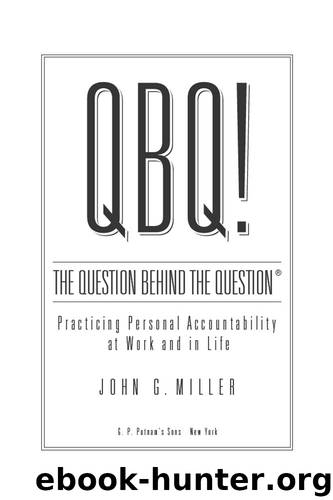QBQ! The Question Behind the Question: Practicing Personal Accountability at Work and in Life by John G. Miller

Author:John G. Miller
Language: eng
Format: mobi
ISBN: 9781101203019
Publisher: Penguin Publishing Group
Published: 2004-09-08T14:00:00+00:00
Right after I had spoken on personal accountability and the QBQ, the CEO of the company I was addressing got up to say a few words. After a few comments to the hundreds of people before him, he pressed a button that projected this message on a huge screen behind him:
Personal accountability begins with YOU!
I know what he was trying to say, but he missed the mark. Personal accountability does NOT begin with you. It begins with me. That’s why it’s called personal accountability. There are two myths about accountability. The first one is when we believe it’s all about holding others accountable, as a manager might in setting standards, helping set goals, defining consequences, and coaching people toward agreed-upon levels of performance. Though important, this is not personal accountability.
The second myth—probably stemming from the constant emphasis on teamwork—is when we think accountability is a team or group thing. Yes, teams are critical, but teams are based on individuals—and successful teams are based on individuals who practice personal accountability.
It is certainly valuable for people to come together to make public commitments, and then afterward discuss what did or did not happen. But true personal accountability is about each of us holding ourselves accountable for our own thinking and behaviors and the results they produce.
Some like to say, “There is no ‘I’ in ‘team,’” but I disagree. No matter the team, there are plenty of I’s, meaning people, individuals, who can practice personal accountability to help the team move forward! The truth is, if everyone is asking, “What can we do?” then nobody is asking, “What can I do?”
This is why the second QBQ guideline is: All QBQs contain an “I,” not “they,” “we,” or “you.” Questions that contain an “I” turn our focus away from other people and circumstances and put it back on ourselves, where it can do the most good. We can’t change other people. We often can’t control circumstances and events. The only things we have any real control over are our own thoughts and actions. Asking questions that focus our efforts and energy on what we can do makes us significantly more effective, not to mention less frustrated and happier.
Accountability groups are great tools. Managers and executives do need to define and communicate standards, but the power of personal accountability comes from questions that begin with “What” or “How” and contain an “I.”
Download
This site does not store any files on its server. We only index and link to content provided by other sites. Please contact the content providers to delete copyright contents if any and email us, we'll remove relevant links or contents immediately.
Happiness by Matthieu Ricard(3040)
How to Stop Worrying and Start Living by Dale Carnegie(2714)
Getting Things Done by David Allen(2691)
The Chimp Paradox by Peters Dr Steve(2383)
What I Need by J. Daniels(2075)
The Empath's Survival Guide by Judith Orloff(2057)
The Finnish Way by Katja Pantzar(1993)
The Smartest Kids in the World by Amanda Ripley(1850)
Jealousy by Osho(1747)
The Joy of Hygge by Jonny Jackson(1735)
Everything in Its Place by Dan Charnas(1734)
Free Yourself from Fears by Joseph O'Connor(1636)
Who Moved My Cheese?: An Amazing Way to Deal With Change in Your Work and in Your Life by Johnson Spencer(1628)
Don't Sweat the Small Stuff at Work by Richard Carlson(1558)
Think Happy to Stay Happy by Becca Anderson(1514)
How to Build Self-Discipline to Exercise by Martin Meadows(1507)
Coping with Anxiety by Edmund Bourne & Lorna Garano(1502)
The Secret History of Freemasonry by Paul Naudon(1492)
Expectation by Anna Hope(1459)
